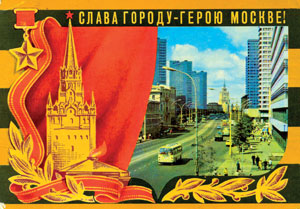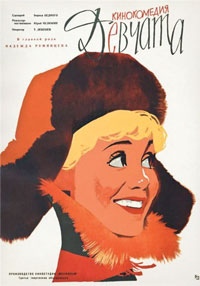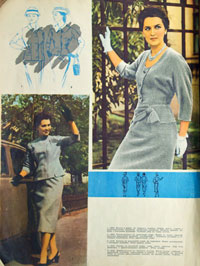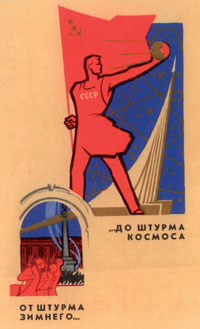LIFE IN MOSCOW IN THE SOVIET 1960S: MEMOIRS OF A BRITISH JOURNALIST PART 2The Sunday People newspaper – then a tabloid selling 5,000,000 copies – contacted me to say they had sent a journalist, Bill Gardner, to Moscow to do a story and he was stuck. He certainly required assistance. He was supposed to be writing the memoirs of Gordon Lonsdale, the spy who had recently been swapped by the Soviets and he could not find him at the appointed place and time in the hotel Moskva. Nor did he have a phone number. I was employed at a vast price to find him. I explained I needed to contact my sources to locate Lonsdale who was going under another name. In fact, it was simplicity itself, not that I ever admitted that.

I had his pseudonym. I started on the top floor of the hotel Moskva and worked my way down. Each floor had a middle aged Russian woman on duty (dezhurnaya) to look after that floor's guests. She also had to spy on the guests and report on what they did but that was beside the point. Two or three floors down, I found him. I knocked at his door and said: "I am looking for you for Mr. Gardner from the Sunday People who could not find you." Success. Bill Gardner, chief reporter, was forced to introduce me to Gordon Lonsdale. The money being paid, hundreds of pounds, shut me up entirely and got me an introduction to the assistant editor of the Sunday People.
Suddenly, I had a commission to interview the oldest people in the world, near Sochi in the Caucasus. This was for the Sunday Times' colour magazine. Celebrated Magnum photographer Eve Arnold was to take the photographs. Eve was used to taking pictures of people like Marilyn Monroe and other Hollywood notables.
All was well until we got to Sochi. No centenarians. No one wanted to know. That was until I phoned Vyacheslav Ivanovich, my KGB friend. Then a local journalist appeared sent by some committee in Moscow. Now they were happy to talk to me and pose for the photographer. When we arrived in Abhazia in the middle of a beautiful valley right up in the spectacular snow-covered Caucasus mountains, the fattened lamb had been killed. A banquet had been laid on. There was one problem. Eve did not drink.
The whole story looked as if it was going straight out of the window. In those days, there could be a real problem if you did not want to drink around Russians. Aghast, I volunteered to drink for her. A bad mistake. They were drinking a home made brew chacha, grape vodka.
After dozens of toasts round a huge table groaning with Caucasian delicacies like shashlyk, satsivi, cheboureki, with half a dozen centenarians and their wives I was hardly able to speak never mind interview anyone. Eve was not allowed to take any photographs that day. So the party was adjourned until the following day. I said to Eve the following morning: "I am not drinking for you today. I am physically not able to do it".
These centenarians drank gallons of alcohol, alternating their own home made wine with chacha. They smoked their own tobacco grown in the nearby hills. They joked about a man of 127 who married a young girl of 21. One of our hosts said: "He died after three weeks. She was too much for him. But he died happy". Eve really did not drink. But she had to. After a couple of chachas, she fell down a flight of stairs and broke two teeth. Interviews were done. Wonderful pictures were taken even though she had broken two teeth. The story and its pictures went round the world.
When I was not busy in Moscow, I did voice-overs for a Moscow film studio. That made me friends and got me roubles. This was good because exchanging pounds for roubles at the official rate meant getting one rouble for one pound. Ridiculous. There was also the Foreign Language Publishing House where I did some translations from Russian into English. This publishing house was the home of British defectors Burgess, Philby and Maclean. Many of my friends who were British Communists worked there.

Late one night, after an evening of drinking in the American Club (drinks were very cheap and the place was full of friendly people), an AP photographer and I happened to be driving past the Hotel Moskva. Men were moving a huge portrait across the street. My photographer friend ordered the taxi to stop and we got out. He got photos of Khrushchev's picture being removed from the lobby of the hotel. He sent his pictures late that night. The following morning, I wrote a story about Khrushchev's dismissal having checked with my friend. It was 1964. Khrushchev had been tipped out ignominiously to become a nonperson. At least, he was not shot or murdered like several of his predecessors.
Brezhnev and Kosygin took over and another era of repression began as the crack down on artists, film makers and writers started all over again. It was slow. An exhibition of paintings in Manezh Square was shut down. Who were these people? Brezhnyev and Kosygin. I wrote a feature article for the Evening Standard. I said Kosygin liked jazz and a few other innocuous things.
This went down with the press department of the Foreign Ministry like a plate of cold borsch. I was summoned. Would I like to write nice articles about the USSR. The head of the pressdepartment described me as a wolf in sheep's clothing. I asked him if he wanted me to write an article about Soviet dentistry. He tried to pretend he was not laughing but he was hardly able to keep his face straight because both he and I knew that an article on Soviet dentistry would turn out badly too.

All the while, I learnt more and more about the Communist Party of the Soviet Union, the ruling elite. They had their own clubs with every kind of drink available in the world. Service was like that of the Savoy bar in London. They had their own 'closed' shops with Western TVs, refrigerators, all kinds of goods not available to ordinary Russians. These were only available for vouchers and vouchers were only given to the Central Committee members.
I heard on the grapevine that two Russian dissidents were about to be put on trial. They were Andrei Sinyavsky and Yuri Daniel. It was a closed trial but I was given a ticket by my KGB friend. They both were sentenced to seven and two years respectively in jail for anti-Soviet propaganda. The Soviets wanted to suppress any kind of criticism no matter how overt.

Of course, all good things come to an end. I was being investigated for changing money on the black market, then a heinous crime though all foreigners did it. It was thought politically they had had enough of the New Statesman's Moscow correspondent. My good friend at the KGB pulled a fivestar general back from his holidays to remove the protocol, which had been written and I prepared to leave. What worried me was what would become of my Russian friends, Elvira Danilovskaya, a film editor, and Sasha Rabinovich, a Soviet journalist.
I asked a good friend of mine at Reuters news agency to constantly phone Rabinovich. Six months later, when the Reuters man had been transferred to Vienna, Rabinovich was sent to a prison camp. I never did find out where. A third Russian friend who restored old icons for a Russian museum took constant refuge in drink as did many of the Soviet intelligentsia.
Text Gloria Stewart
|
 +65 6696 7068
+65 6696 7068
 info@meridian103.com
info@meridian103.com
 PDA
PDA
 +65 6696 7068
+65 6696 7068
 info@meridian103.com
info@meridian103.com
 PDA
PDA
